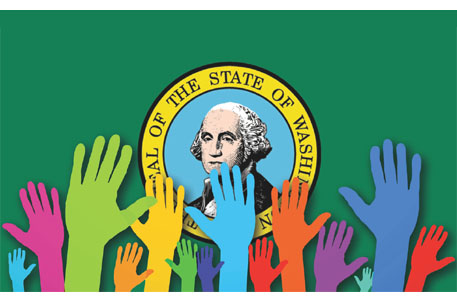STATE GOVERNMENT
On race, the WVRA and dog-whistle politics
The following story appears in the Washington State Labor Council’s 2018 Legislative Report (HTML or PDF) published in May.
By ERIC GONZÁLEZ ALFARO
We can no longer endure the concept of race-neutral, color blind, or what should be more accurately described as race ignorant. Our cultural and ethnic identities deserve to be acknowledged and are relevant in shaping public policy.
While the House debated the Washington Voting Rights Act, a handful of Republicans delivered floor speeches that were openly demeaning and riddled with dog-whistle commentary on race and identity.
“We need to protect the small towns… We need to protect those small players, where people are involved for the best reasons to try make their communities better places to live, work and raise families… We forget that the small towns in Washington are in many ways the backbone and the culture of the things that make this state such a great place to live.” — Rep. Jim Walsh
 Walsh misses the point of the Washington Voting Rights Act. His remarks shed a light on “the little guy” he’s speaking for: the status quo that refuses to see that the world around him is much larger and rapidly changing. It is precisely this inequitable myopic vision that leads to lawsuits and needless costs.
Walsh misses the point of the Washington Voting Rights Act. His remarks shed a light on “the little guy” he’s speaking for: the status quo that refuses to see that the world around him is much larger and rapidly changing. It is precisely this inequitable myopic vision that leads to lawsuits and needless costs.
The WVRA allows local governments to restructure their voting systems to better reflect the diversity of the community, but most importantly, it resolves issues around polarized voting where marginalized communities will finally have a voice in their democracy, without first going to court. The WVRA is also not about electing a person of color to represent communities of color. It is about electing a candidate that understands the breadth of challenges impacting communities that have long been ignored, marginalized, or silenced in the process – systemically.
Workers in the fast food industry, janitors, sanitation workers, hospice and construction workers, teachers and farm workers – they are the backbone of small communities, yet they are not a monolith.
“What if there’s not anyone that looks like me running for this office? To me it has nothing to do with what they look like. I don’t care about the color of someone’s skin… There are people across this aisle who have a different color skin than I do, and I love them dearly and I enjoy working with them… What it has to do with is what are their policies, their values, their belief systems – that’s what I vote for; not the color of their skin.” – Rep. Brad Klippert
Meanwhile, Klippert prime sponsored the “English Language Empowerment Act,” which states: “Command of the English language is necessary to participate in and take full advantage of the opportunities afforded by American life. Absent a rudimentary command of the English language, citizens are unable to make their voices heard by the legislative process, effectively exercise their right to vote, or fully understand the rights afforded them by the United States and Washington Constitutions.”
I beg to differ. Meeting the definition of American, if there is just one, must not be premised on command of the English language, nor should we pretend that constituents are to blame for their exclusion from the legislative process. Offensive rhetoric like this routinely occurs in Olympia, yet many don’t notice it, except for those of us who’ve experienced and had to navigate micro-aggressions, institutionalized racism, gate-keeping and silent compliance. We hear and see it daily.
Others are more direct in their dismissiveness and will go to extraordinary leaps of logic to justify an inequitable voting system:
“This bill is an insult to people of color and minorities. This bill says to you, if you are a minority person, we don’t think you are smart enough, attractive enough as a candidate, and good enough to get elected in our traditional election system.”—Rep. Liz Pike
Earlier in session, a lobbyist I respect approached me and facetiously remarked, “This must be a hearing on one of your bills.” The room was packed with Spanish speaking language interpreters, many of them Latino. They were not people I organized and, in fact, were on the opposite side of my issue.
I cannot tell you how often issues we advocate for, that are around racial equity or immigrant justice, are better received, seen as altruistic, when they come from white men or white women but seen as self-serving when these appeals come from people that have come from these communities.
When we seek to grow our diversity and equity, especially in positions of influence, we shouldn’t put restrictions on when it’s convenient to be our full selves. If we do, we have to ask—for whom is it a problem and why?

Eric González Alfaro is Legislative and Policy Director of the Washington State Labor Council, AFL-CIO, the largest labor organization in the Evergreen State, representing the interests of more than 600 local unions and approximately 450,000 rank-and-file union members.
Click here to see more reports from the Washington State Labor Council’s 2018 Legislative Report. Or download the entire 8-page PDF.





